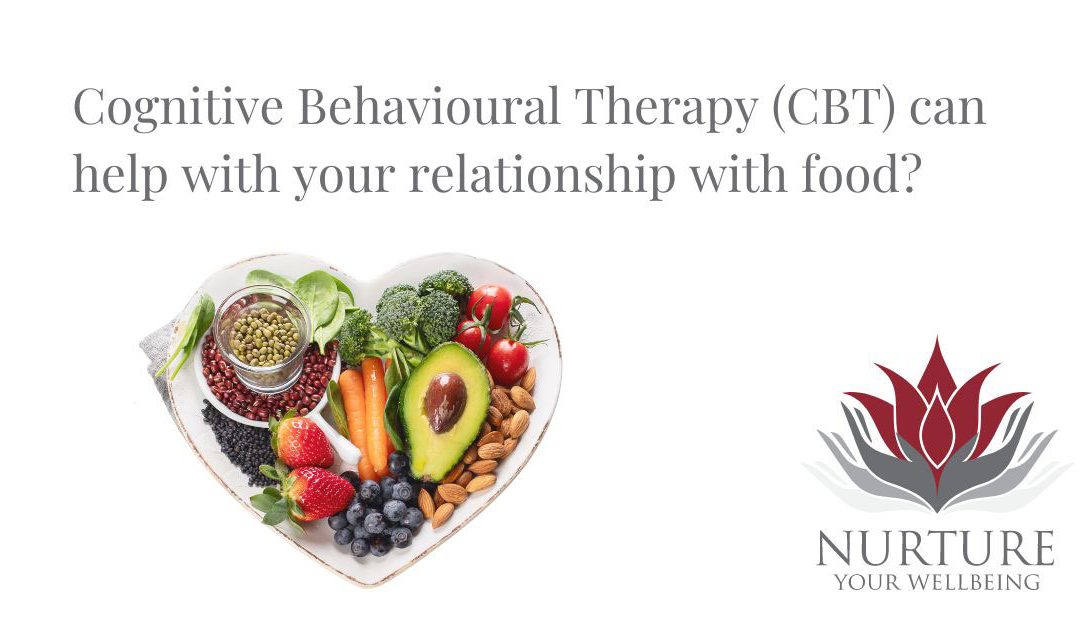Introduction
Struggling with an unhealthy relationship with food? Cognitive Behavioral Therapy (CBT) might be the key to unlocking a healthier and more balanced approach to eating. In this article, we will explore how CBT can help individuals overcome issues such as emotional eating, binge eating, and food cravings.
CBT is a psychotherapy approach that focuses on understanding the connection between thoughts, feelings, and behaviors. When it comes to food, CBT can help you identify and challenge negative thoughts and beliefs that contribute to unhealthy eating patterns. By examining the underlying emotions and triggers, CBT empowers you to develop new coping strategies and make lasting changes in your relationship with food.
With the guidance of a skilled therapist, CBT can equip you with practical tools and techniques to build resilience, manage stress, and develop healthier habits. From recognising and addressing emotional triggers to learning mindful eating practices, CBT offers a holistic approach to transforming your relationship with food.
If you’re ready to break free from the cycle of yo-yo dieting and find a healthier balance, CBT could be the supportive and transformative therapy you’ve been searching for. Join us as we delve deeper into how CBT can help with food-related issues and provide you with the tools you need to take control of your well-being.
What is Cognitive Behavioural Therapy (CBT)?
Cognitive Behavioural Therapy (CBT) is a widely recognised psychotherapy approach that focuses on the connection between thoughts, feelings, and behaviours. It is an evidence-based treatment that has been proven effective for a range of mental health conditions, including eating disorders and unhealthy relationships with food.
In CBT, the therapist helps you identify and understand the negative thought patterns and beliefs that contribute to your unhealthy eating behaviours. By challenging and reframing these thoughts, you can develop healthier attitudes and behaviours towards food.
CBT is a structured and goal-oriented therapy that typically involves weekly sessions with a trained therapist. The therapist provides guidance and support as you work together to identify and address the underlying causes of your food-related issues.
Understanding the Relationship Between Emotions and Food
Many individuals turn to food as a way to cope with their emotions. Whether it’s stress, sadness, or boredom, emotional eating can become a vicious cycle that perpetuates unhealthy habits and negative emotions.
CBT can help you break free from this cycle by helping you understand the relationship between your emotions and food. Through self-reflection and exploration, you can identify the emotional triggers that lead to unhealthy eating patterns. By gaining insight into your emotional state, you can develop alternative coping strategies that do not involve food.
How CBT Helps with Food and Emotional Eating
Emotional eating is a common problem that many individuals struggle with. CBT can be highly effective in addressing emotional eating by helping you develop alternative coping strategies and healthier ways to deal with your emotions.
One of the key components of CBT for emotional eating is identifying and challenging the negative thoughts and beliefs that drive the behavior. By examining the underlying emotions and thoughts, you can gain a better understanding of why you turn to food for comfort.
CBT also emphasises the importance of developing healthier coping mechanisms. Through CBT, you can learn new skills and techniques to manage your emotions and stress without resorting to food. These may include relaxation techniques, problem-solving strategies, or engaging in activities that bring you joy and fulfillment.
Identifying and Challenging Negative Thought Patterns Related to Food
Negative thought patterns and beliefs about food can be deeply ingrained and can contribute to unhealthy eating behaviours. CBT helps you identify and challenge these negative thoughts, allowing you to develop healthier attitudes and behaviours towards food.
One common negative thought pattern related to food is “all-or-nothing” thinking. This type of thinking often leads to restrictive diets, followed by episodes of overeating or binge eating. Through CBT, you can learn to recognise and challenge this type of thinking, allowing for a more balanced approach to eating.
CBT also helps you challenge other negative beliefs, such as associating certain foods with guilt or shame. By examining and reframing these beliefs, you can develop a healthier and more positive relationship with food.
Developing Healthier Coping Strategies Through CBT
CBT equips you with practical tools and techniques to develop healthier coping strategies. Instead of turning to food for comfort or stress relief, CBT helps you find alternative ways to manage your emotions and deal with difficult situations.
One effective technique used in CBT is called “self-monitoring.” This involves keeping a record of your eating habits, emotions, and triggers. By analysing these records, you can identify patterns and gain insight into the factors that contribute to your food-related issues.
CBT also emphasises the importance of setting realistic goals and making gradual changes. Instead of trying to overhaul your entire eating habits overnight, CBT encourages small, achievable steps towards lasting change. This approach increases your chances of success and helps you build confidence along the way.
Incorporating Mindfulness Techniques into Your Relationship with Food
Mindfulness is a key component of CBT when it comes to food-related issues. Mindful eating involves paying attention to the present moment, being fully aware of your thoughts, feelings, and bodily sensations while eating.
By practicing mindfulness, you can develop a greater awareness of your hunger and fullness cues. This allows you to eat in response to physical hunger rather than emotional triggers. Mindful eating also encourages you to savor and enjoy your food, promoting a more positive and satisfying eating experience.
CBT incorporates various mindfulness techniques, such as deep breathing exercises and guided imagery, to help you cultivate a more mindful approach to eating. These techniques can be practiced both during meals and in everyday life, helping you develop a healthier and more balanced relationship with food.
CBT Techniques for Overcoming Food Cravings
Food cravings can be a significant challenge when it comes to maintaining a healthy relationship with food. CBT offers techniques to help you overcome these cravings and make healthier choices.
One effective technique is called “urge surfing.” Instead of giving in to the craving or trying to suppress it, urge surfing involves observing the craving without judgment and allowing it to pass naturally. This technique helps you develop greater self-control and reduces the intensity of cravings over time.
CBT also helps you identify the triggers that lead to food cravings. By understanding the underlying causes, you can develop strategies to avoid or cope with these triggers more effectively. This may involve finding alternative activities to distract yourself, seeking support from friends or family, or practicing relaxation techniques to reduce stress.
Working with a CBT Therapist for Food-Related Issues
While self-help resources can be beneficial, working with a skilled CBT therapist is often the most effective way to address food-related issues. A therapist can provide guidance, support, and personalised strategies tailored to your specific needs.
A CBT therapist will work with you to set goals and develop an individualised treatment plan. They will help you navigate the challenges and obstacles that may arise along the way, providing you with the tools and support you need to make lasting changes.
It’s important to find a therapist who specialises in CBT and has experience working with food-related issues. A trained professional can guide you through the process and ensure that you receive the most effective treatment.
Success Stories: Real-Life Examples of How CBT Has Helped with Food
CBT has transformed the lives of many individuals struggling with food-related issues. Here are a few real-life success stories that highlight the effectiveness of CBT in overcoming these challenges:
- Sarah, a 35-year-old woman, struggled with emotional eating for years. Through CBT, she learned to identify the emotions that triggered her overeating and developed healthier coping strategies. Today, Sarah no longer turns to food for comfort and has developed a more positive relationship with her body and food.
- John, a 45-year-old man, had a long history of yo-yo dieting and binge eating. With the help of CBT, he learned to challenge his negative thoughts about food and develop a more balanced approach to eating. John now maintains a healthy weight and feels more confident and in control of his eating habits.
These success stories demonstrate the transformative power of CBT in helping individuals overcome food-related challenges and develop a healthier relationship with food.
Conclusion: Taking the First Steps Towards a Healthier Relationship with Food Through CBT
If you’re ready to break free from the cycle of yo-yo dieting and find a healthier balance, CBT could be the supportive and transformative therapy you’ve been searching for. By addressing the underlying thoughts, emotions, and behaviors related to food, CBT empowers you to make lasting changes and develop a healthier relationship with food.
From identifying and challenging negative thought patterns to incorporating mindfulness techniques and developing healthier coping strategies, CBT provides a comprehensive approach to overcoming food-related issues.
Remember, working with a skilled CBT therapist can provide the guidance and support you need to navigate the challenges and obstacles that may arise along the way. By taking the first steps towards seeking help, you’re on your way to a healthier and more balanced relationship with food.
So why wait? Start your journey towards a healthier relationship with food today and discover the transformative power of CBT.
CBT Help with Food
Visit me at the Angel Wellness Retreat in Ongar. Contact me to make your appointment.




Recent Comments